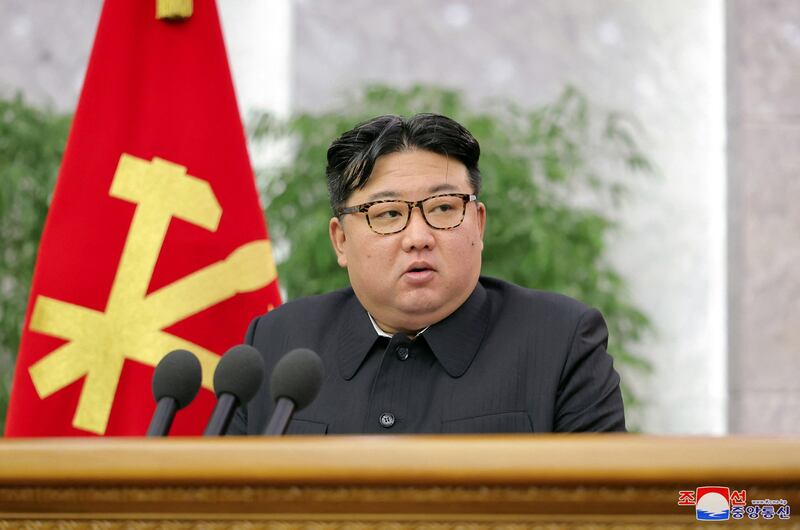China sent its vice foreign minister to Pyongyang for a discussion that could set the stage for high-level bilateral engagements including a summit, as North Korea aims to concrete its relations with its regime backer in the face of its economic difficulties.
“A delegation of the Ministry of Foreign Affairs of the People’s Republic of China headed by Sun Weidong, Vice Foreign Minister, arrived in Pyongyang via Sinuiju, on the 25th,” North Korea’s state-run Korean Central News Agency said Friday.
“He was greeted at the border bridge by the officials of the Ministry of Foreign Affairs of the DPRK and the minister of the embassy of the People’s Republic of China in the DPRK,” KCNA added, referring to North Korea’s formal name.
The visit comes as China and North Korea mark the 75th anniversary of normalization of bilateral relations. The two countries last month vowed to use this occasion as an opportunity to further upgrade their cooperation in the fields of “mutual interest.”
Separately, in December, North Korea’s vice foreign minister Pak Myong Ho visited Beijing and met with Sun, as well as China’s foreign minister Wang Yi.
The meeting was described by the North’s state media as a platform where “both sides exchanged views on strengthening and developing bilateral relations in 2024, marking the 75th anniversary of the establishment of North Korea-China diplomatic relations.”
The report added that the two sides will continue to discuss ways to enhance their “mutual interest” and “strategic cooperation.”
Kim In-ae, South Korea’s vice spokesperson for the unification ministry, said in a regular briefing Friday that Seoul saw Sun’s visit as an extension of the December talks, indicating ongoing discussions to further boost cooperation between the two countries.
South Korea’s government and parliamentary sources who are familiar with the development, requesting anonymity due to the sensitivity of the matter, told Radio Free Asia that there have been constant signs of a summit preparation between China and North Korea since last year.
Apart from China, North Korea has recently beefed up its efforts to enhance relations with Russia. In September, for instance, North Korean leader Kim Jong Un and his Russian counterpart Vladimir Putin held a summit in Russia’s Far East and agreed to upgrade their relations in all fields including economy, technology and military.
Since then, accusations have been made that Pyongyang and Moscow are engaged in arms trading, with Ukraine alleging that North Korean missiles have been used in Russia’s aggression against Ukraine – a claim that both Pyongyang and Moscow have denied.
China, on the other hand, has kept a distance from the Pyongyang-Moscow cooperation so far, but this might change.
The sources who talked to RFA said Putin’s possible visit to Pyongyang this year, as discussed during North Korea’s foreign minister Choe Son Hui’s visit to Moscow last week, may expedite a summit between China and North Korea, adding that China is likely to intervene in regional diplomacy to optimize its diplomatic interests.
Economic hardship
North Korea’s economic struggles could be prompting Pyongyang to seek closer ties with regional allies.
Its leader Kim made a rare acknowledgement this week of the dire state of his country's economy, labeling the economic problem as a "serious political issue."
His government revealed the “inability to provide even basic necessities such as food, groceries, and consumer goods to the local people,” Kim said, adding that the “overall local economy is currently in a very pitiful state, lacking even basic conditions.”

North Korea’s economy contracted for the third consecutive year in 2022, according to the South’s Statistics Korea report in December. The latest available data showed a 0.2% year-on-year drop in North Korea’s GDP in 2022, following a 0.1 % decrease in 2021, and a 4.5 % contraction in 2020.
But the North’s economic hardship may be eased this year, with support from its regime backers, according to the Korea Development Institute.
The South Korean think tank said in a report released earlier this month that North Korea’s economy could experience a turnaround, contingent on economic support from China and Russia.
It also noted that resuming and expanding tourism cooperation with China and Russia is one of Pyongyang’s prioritized economic goals for this year.
Pressure from Seoul
Besides economic difficulties, Pyongyang is also facing intensified diplomatic pressure from South Korea on the international stage.
Kim Gunn, South Korea’s Special Representative for Korean Peninsula Peace and Security Affairs, for instance, requested the support of the Office of the United Nations High Commissioner for Human Rights in raising international awareness about North Korea’s human rights issues during his visit to Geneva on Thursday.
The South Korean envoy “lamented North Korea’s intensification of social control and oppression to support its military buildup at the expense of the economy and people’s livelihoods,” the South’s foreign ministry said in a statement Friday, at his meeting with with the Acting United Nations High Commissioner for Human Rights Nada Al-Nashif.
Separately, Kim Gunn also visited the E.U. headquarters in Brussels on Tuesday and emphasized the necessity of collective responses, proposing collaboration in blocking funding for North Korea’s nuclear and missile development.
Edited by Taejun Kang and Mike Firn.
